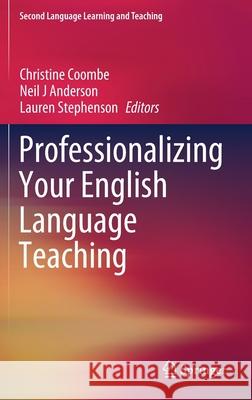Professionalizing Your English Language Teaching » książka



Professionalizing Your English Language Teaching
ISBN-13: 9783030347611 / Angielski / Twarda / 2020 / 435 str.
Professionalizing Your English Language Teaching
ISBN-13: 9783030347611 / Angielski / Twarda / 2020 / 435 str.
(netto: 306,68 VAT: 5%)
Najniższa cena z 30 dni: 308,41
ok. 16-18 dni roboczych.
Darmowa dostawa!
What is Professionalism? Research on Professionalism in ELT.- Positive Psychology.- The Importance of Professional Learning Communities.- Teacher Professional Identity.- Professionalism and Integrity.- Personal and Professional Strategic Planning.- Increasing your Productivity & Effectiveness.- Time Management Skills for the Busy TESOL Professional.- Improving Your Communication Skills.- Transitioning from Teacher to Manager.- Using Technology Effectively.- Transforming Yourself into an Online Educator.- Dealing with Change/Motivation.- Stress Management.- Conflict Resolution Skills.- Enhancing your Employability.- Career Path Development.- Marketing Yourself (To Include Effective CVs, Job Interviewing Skills, Networking, Social Media Skills).- Developing your Online Profile.- Developing Leadership Capacity.- Increasing your Happiness Quotient.- Expanding your Geographical Horizons.- Creating your Own Professional Development & Lifelong Learning Plan.- Increasing your Language Proficiency.- Getting Involved in Research.- Doing a Conference Presentation.- Publishing Pedagogical Materials.- Publishing Research-based Materials.- Involving Yourself in Professional Associations.- Mentoring/Coaching.- Engaging in Reflective Practice.- Giving Back to the Profession.- Giving Back to the Profession.- Professionalizing your Non-professional Life.- Surviving the Promotion and Tenure Process.- Thinking Ahead to Retirement.
Christine Coombe has a Ph.D. in Foreign/Second Language Education from The Ohio State University. She is currently an Associate Professor of General Studies at Dubai Men's College, and is the former Testing and Measurements Supervisor at UAE University and Assessment Coordinator at Zayed University. Christine is co-author of A Practical Guide to Assessing English Language Learners (2007, University of Michigan Press) and co-editor of Assessment Practices (2003, TESOL Publications); Evaluating Teacher Effectiveness in EF/SL Contexts (2007, UMP); Language Teacher Research in the Middle East (2007, TESOL Publications); Leadership in English Language Teaching and Learning (2008, UMP); Applications of Task-based Learning in TESOL (2010, TESOL Publications); The Cambridge Guide to Second Language Assessment (2012, Cambridge University Press); Reigniting, Retooling and Retiring in English Language Teaching (2012, University of Michigan Press); The Cambridge Guide to Research in Language Teaching and Learning (Cambridge University Press, 2015); and Volume 8 of the TESOL Encyclopedia of ELT (Wiley Blackwell, 2018). Christine's forthcoming books are on innovation in the MENA, international perspectives on language teaching associations and professionalism in education.
During her tenure in the Middle East, she won numerous awards including: 2002 Spaan Fellowship for Research in Second/Foreign Language Assessment; 2002-03 TOEFL Outstanding Young Scholar Award; TOEFL Board Grant for 2003-04, 2005-06, 2007-08 and 2009-10 for her work in delivering assessment training assessment in developing countries. She served on the TESOL Board of Directors as Convention Chair for Tampa 2006 and was the recipient of the Chancellor's Teacher of the Year for 2003-04. She was TESOL President (2011-2012) and a member of the TESOL Board of Directors (2010-2013). Christine received the British Council's International Assessment Award for 2013. Her most recent honors were being named to TESOL's 50@50 which "recognizes professionals who have made significant contributions to the TESOL profession in the past 50 years." Dr Coombe is the 2018 recipient of the James E. Alatis Award which recognizes exemplary service to TESOL.
Neil J Anderson is a Professor of English Language Teaching and Learning at Brigham Young University-Hawaii and Associate Director in the Edward D. Smith Center for Learning and Teaching. Professor Anderson is the author or co-editor of over 50 books, book chapters, and journal articles. His research interests include second language reading, language learner strategies, learner self-assessment, motivation in language teaching and learning, and ELT leadership development. Professor Anderson served as President of TESOL International Association from 2001 to 2002. He has been a Fulbright Teaching and Research Scholar in Costa Rica (2002-2003) and in Guatemala (2009-2010). Professor Anderson was the 2014 recipient of the prestigious TESOL International Association James Alatis Service Award. In 2016, on the 50th anniversary of the TESOL International Association, Professor Anderson was recognized as one of the 50 individuals who have made a significant contribution to the profession of teaching English to speakers of other languages.
Lauren Stephenson is currently a Professor of Learning, Teaching and Educational Leadership in the Faculty of Education and Arts, Australian Catholic University. She holds a Ph.D. in Educational Leadership from the University of Sydney and is an experienced educator and educational leader with a background in teacher education, educational leadership and teaching English as an additional language/dialect (EAL/D). She has an extensive record of scholarly activities at national and international levels and has published in the areas of educational leadership, teacher professional learning, EAL/D, action research and narrative and autoethnographic research methods.
Written by leading experts in the field of TESOL, this book explores the literature on various topic areas and demonstrates how teachers can increase their levels of professionalism by acquiring some general and field-specific strategies.
Being a teaching professional is not simply about having the right teaching qualifications and good academic standing, it involves a commitment to being innovative and transformative in the classroom and helping both students and colleagues achieve their goals. A dictionary definition of professionalism reads as follows: professionalism is the conduct, aims, or qualities that characterize or mark a profession or a professional person; and it defines a profession as a calling requiring specialized knowledge and often long and intensive academic preparation (Merriam-Webster, 2013). However, according to Bowman (2013), professionalism is less a matter of what professionals actually do and more a matter of who they are as human beings. Both of these views imply that professionalism encompasses a number of different attributes, and, together, these attributes identify and define a professional.
The book is primarily intended for teachers at all levels and in all contexts who are interested in improving their professionalism and developing strategies that can take them to higher levels in the field of TESOL/ELT.1997-2026 DolnySlask.com Agencja Internetowa
KrainaKsiazek.PL - Księgarnia Internetowa









